|
June 23, 2020 - No. 43
Postal Workers Step Up the Fight for
Their Rights
Federal Arbitrator Refuses to Address
Necessary Demands
- Louis Lang -
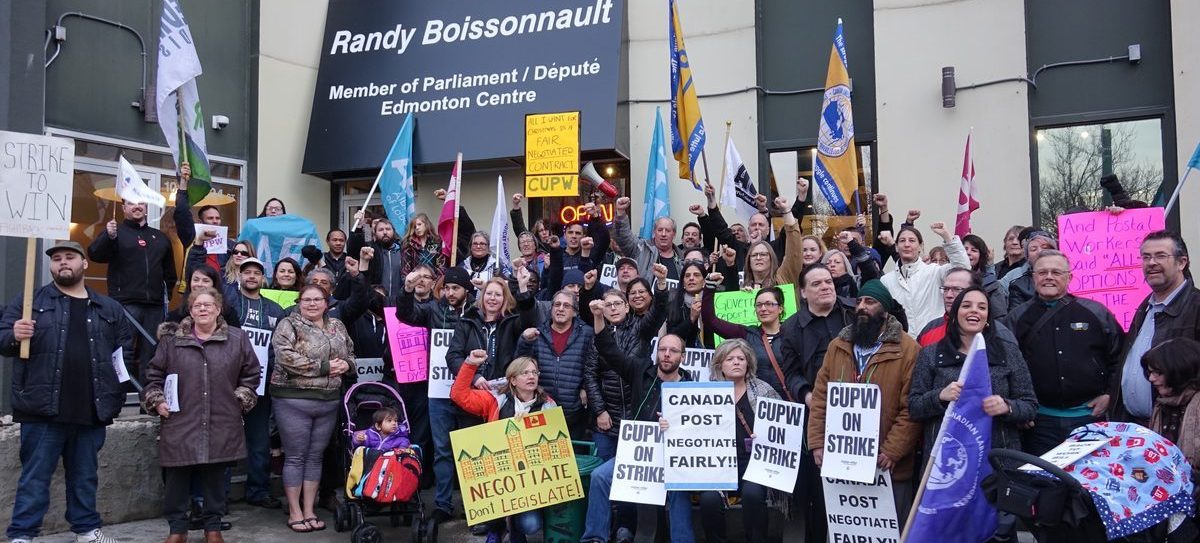
Edmonton protest November 22,
2018, against Bill C-89 legislating postal
workers back to work.
Dominion Diamond Mines in Northwest
Territories Goes Under
Bankruptcy Protection
• Workers Determined to
Defend Their Rights - Todd Parsons
Workers
Continue to Speak Out About Safety Concerns
• The Need to Break the
Silence on Lack of Safety on Construction
Sites - Evans Dupuis
• Steelworkers Cannot
Accept any Loosening of Health and Safety
Standards for Mine Workers - André
Racicot
• Postal Workers' Safety
Concerns During Pandemic - Toni
MacAfee
Postal Workers Step Up the Fight
for Their Rights
- Louis Lang -

Picket line in Napanee, November 10, 2018.
On June 11, arbitrator Elizabeth McPherson, a
former chair of the Canada Industrial Relations
Board, who was appointed as part of the
implementation of the Postal Services
Resumption and Continuation Act, Bill
C-89, released her final report. The Act was
adopted by Parliament on November 26, 2018, to
declare the rotating strikes of postal workers
illegal and, under the threat of heavy fines
against individual workers and the union, it
forced the workers to end their legal strike
actions.
The Canadian Union of Postal Workers (CUPW) had
been in negotiations with Canada Post for close
to one year on behalf of Rural Suburban Mail
Carriers (RSMCs), whose contract expired on
December 31, 2017, and Urban Operations which
include letter carriers, mail service couriers
and all the inside workers, whose contract
expired on January 31, 2018.
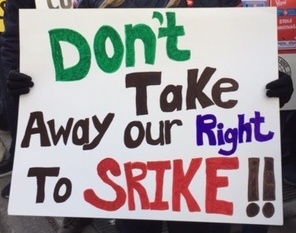 The November 22,
2018 issue of Workers' Forum pointed out
that it was Canada Post and the Trudeau
government who provoked a crisis by refusing to
negotiate with the union and instead resorting
to federal legislation to criminalize the
workers' struggle for their rights.[1] The November 22,
2018 issue of Workers' Forum pointed out
that it was Canada Post and the Trudeau
government who provoked a crisis by refusing to
negotiate with the union and instead resorting
to federal legislation to criminalize the
workers' struggle for their rights.[1]
Bill C-89 called for 90 days of
mediation-arbitration and hearings began on
January 16, 2019. This process did not go any
better then the negotiations and after continual
postponements and delays the final hearing took
place on May 6 and the arbitrator issued her
decision on June 11.
Instead of the 90 days called for in the
legislation, the process took more than 560
days. There is no explanation in the report
about the inability of the arbitrator to do her
work in accordance with the federal legislation.
It is clear from the report that the arbitrator
has failed to address the imposed regime of
non-negotiations that was followed by Canada
Post and supported by the Liberal government.
With the arbitration hearing spread out over 560
days, the main demands of postal workers still
have not been properly considered. The
arbitrator failed to resolve the important
health and safety issues, the two-tier wage
system, pay for all hours worked for RSMCs, the
overburdening of letter carriers and important
staffing issues for inside workers with the
increased use of temporary workers and part-time
precarious work.
It is of great concern for postal workers that
after almost two years without a contract
they're forced to work under federal orders but
their concerns for health and safety and proper
working conditions which they require to perform
their work have not been addressed. The
arbitrator has issued a report which is in line
with the refusal of Canada Post to negotiate
with the workers knowing full well that they
could count on the Trudeau Liberals to use
legislative powers to criminalize any resistance
by the workers and eliminate any semblance of
negotiations.
What the Arbitrator Had to Say
The term of the contract will be for four years
starting in January 2018 so, in effect, there is
only 18 months left in this contract.
The wage scales set out in Appendix "A" of the
collective agreement shall be increased by the
following amounts on the dates indicated:
February 1, 2018 -- 2.0 per cent;
February 1, 2019 -- 2.0 per cent;
February 1, 2020 -- 2.5 per cent;
February 1, 2021 -- 2.9 per cent.
"The economic increase for the RSMC unit is to
be applied after implementation of the increases
mandated by Arbitrator Flynn's pay equity award
and those agreed upon by the parties in the
course of that process. The intent is to
maintain the pay equity that was achieved
through the Flynn arbitration process."
The arbitrator refused to deal with the
two-tier wage system that exists. For example,
an inside worker hired prior to 2013 has an
hourly wage that is seven dollars more than a
worker in the same classification hired after
February 1, 2013. In order to deal with this
issue, the union demanded that the eight years
that it takes for these workers to reach the
same maximum be reduced. The arbitrator refused
the demand and her decision maintains the same
arrangement in both groups one and two of the
Urban Operations group.
On the issue of health and safety, letter
carriers have been suffering serious injuries on
their routes due to the two bundle system which
was introduced with the sequencing of mail. The
arbitrator refused to address the demand of the
workers to eliminate this dangerous work method.
The problem is recognized in the report but the
arbitrator failed to take a stand to prevent
further injuries. The comment in the report on
this serious problem clearly exposes the nature
of the arbitration process which is blind to the
needs of the workers. On the issue of the two
bundle system the arbitrator said:
"This arbitrator is not an expert in ergonomics
and is reluctant to specify a particular
sortation and delivery method in the collective
agreement. Instead, I am proposing a Memorandum
of Agreement that would formalize the current
practice that letter carriers will not be
disciplined if they chose to integrate their
sequenced and manual mail prior to commencing
the delivery portion of their route."
Similarly, on the issue of the overburdening of
letter carriers the arbitrator refused to take a
stand and proposed another study to discuss the
letter carrier route volume update process. This
means that once again the problems faced by
letter carriers with the huge increase in parcel
volumes and the need for route restructures will
be the subject to further studies with no
solution in sight.
The arbitrator had no problem accepting Canada
Post's proposal for a "temporary peak workforce"
which would have no limitations on the days of
the week that these employees can be deployed.
Instead of filling vacant positions and
maximizing full-time regular positions by
combining part-time positions based on the hours
worked, the ability of the corporation to use
temporary workers will lead to the creation of
more precarious work, and staffing issues that
exist will remain unresolved.
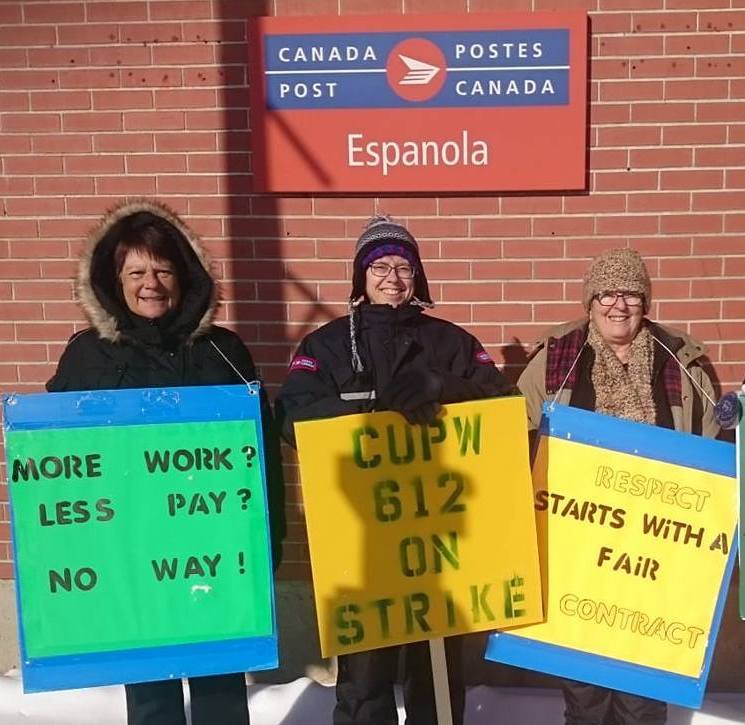 As far as the
RSMCs are concerned, the arbitrator refused to
deal with the union's demands that these workers
be paid for all hours worked. This would require
the restructuring of their routes based on a
standard eight-hour day in the same way as
letter carriers in the Urban group. The
arbitrator refused to change the existing
piecework model and proposed another study on
how to measure content, work load and
appropriate pay methods to compensate RSMCs for
all hours worked over 40 hours a week. The
arbitrator also denied the union's demand for
hourly compensation for weekend parcel delivery
by RSMCs. Instead the arbitrator agreed with
Canada Post's proposal to provide RSMCs who
deliver parcels during the weekends with $2 for
each parcel. As far as the
RSMCs are concerned, the arbitrator refused to
deal with the union's demands that these workers
be paid for all hours worked. This would require
the restructuring of their routes based on a
standard eight-hour day in the same way as
letter carriers in the Urban group. The
arbitrator refused to change the existing
piecework model and proposed another study on
how to measure content, work load and
appropriate pay methods to compensate RSMCs for
all hours worked over 40 hours a week. The
arbitrator also denied the union's demand for
hourly compensation for weekend parcel delivery
by RSMCs. Instead the arbitrator agreed with
Canada Post's proposal to provide RSMCs who
deliver parcels during the weekends with $2 for
each parcel.
Bill C-89 and Arbitration Decision No
Assistance to
Postal Workers Working During Pandemic
The mediation-arbitration process imposed by
Bill C-89 has failed to resolve the serious
problems facing postal workers. The main purpose
of the Bill was to stop the workers from
fighting for their rights to decent working
conditions and a safe working environment. This
problem has become much more serious as postal
workers have continued to work throughout the
pandemic. The important service which they
provide sorting and delivering letters and
parcels in every community in Canada has put
them on the front lines of the fight against
COVID-19 at a great risk to their own health.
It is inconceivable that under such dangerous
conditions postal workers still have federal
legislation hanging over their heads with
threats of heavy fines if they undertake any job
actions to protect their rights. In spite of
this, postal workers across the country have
taken actions like closing down plants and
refusing to do work if proper safety measures
were not observed by Canada Post. It has been
due to the role that workers played in affirming
their rights that postal services have been
maintained to the level needed by Canadians.
It is high time that Bill C-89 is abolished so
that Canada Post has no place to hide and has no
excuse to turn a deaf ear to the demands of the
workers.
For the arbitrator's full report, click
here.
Note
1. See Workers'
Forum, November 22, 2018.

Dominion Diamond Mines in
Northwest Territories Goes
Under Bankruptcy Protection
- Interview, Todd Parsons,
President, Union of Northern Workers,
Northwest Territories -
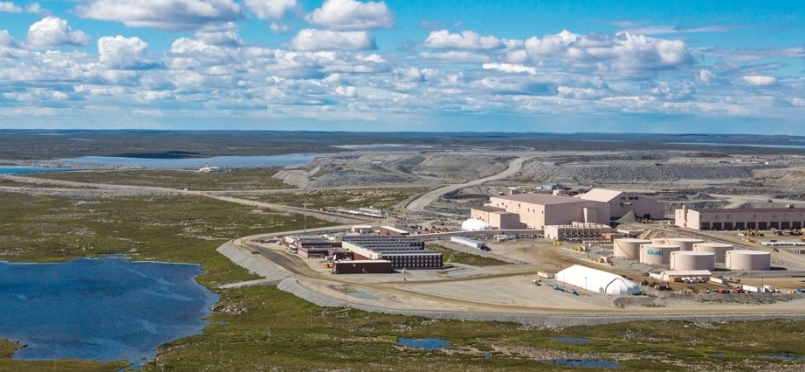
Ekati Diamond Mine main camp
Dominion Diamond Mines (DDM) has been under
insolvency protection of the Companies'
Creditors Arrangement Act (CCAA) since
April 22. Workers and their union are demanding
that the pension obligations DDM has towards
them be maintained and that employment
obligations provided for in their collective
agreement be protected. They are also demanding
that the Ekati mine be kept operating.
Dominion Diamond Mines is one of the world's
largest producers and suppliers of premium rough
diamonds on the global markets. It owns and
operates the Ekati Diamond Mine and owns 40 per
cent of the Diavik Diamond Mine whose main owner
is Rio Tinto, which also operates the mine. The
company also owns the Lac de Gras Diamond
Project which is part of the kimberlite field
that includes the Ekati and Diavik diamond
mines. The project is considered to have
significant exploration potential for the
discovery of new diamondiferous kimberlites. All
these sites are located around 300 kilometres
northeast of Yellowknife.
In addition to its mining and exploration
operations,
Dominion has sales offices in Belgium and India.
In 2017, Dominion
Diamond Mines was bought by the U.S.-based
monopoly the Washington
Companies which owns companies in rail
transportation, marine
transportation, construction and mining, heavy
equipment sales,
aviation technology, and real estate
development.
Workers' Forum is posting below a recent
interview with Todd Parsons, the President of
the Union of Northern Workers (UNW) which
represents over 400 workers at the Ekati Diamond
Mine.
Workers' Forum: How big an
employer is Dominion Diamond Mines in the
Northwest Territories?
Todd Parsons: Dominion Diamond
Mines is one of the largest employers, next to
the government, in our region. Among other
things, it provides employment to the Aboriginal
people in a lot of our smaller communities as
well as to people in Yellowknife. While 400
bargaining unit members are affected by the
filing of the insolvency protection, there are
also 700 more who are not in our bargaining unit
but work in the mine and are also affected.
Closure of the mine would have a devastating
impact on the workers and their communities and
on the whole economy of the Northwest
Territories.
WF: Dominion Diamond Mines
actually shut down the Ekati Diamond Mine on
March 19, before filing for insolvency
protection, didn't they?
TP: Yes. The company shut down
the site, reporting that the shutdown was
related to concern over COVID-19 and their
inability to see the diamonds that are mined at
the site.[1]
The company said that they were not able to sell
their product on the markets because the trading
floors in Belgium and across Europe were closed,
or mostly closed, because of COVID-19. The mine
has actually never reopened. We raised the issue
with the employer but they have not provided any
solid reopening date.
Meanwhile, the other diamond company, Diavik
Diamond Mine, which is owned at 40 per cent by
Dominion Diamond Mine and the rest by Rio Tinto,
never shut down and says that they are able to
sell their diamonds on the global markets. There
is a conflict between them on this matter. It is
hard to confirm what the real facts are in this
regard.
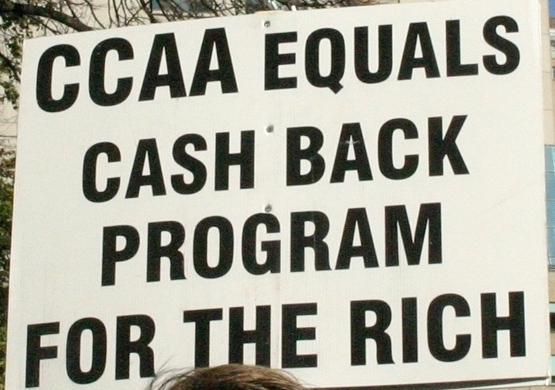 A month after
shutting down the Ekati Mine, Dominion Diamond
Mines filed and obtained insolvency protection
under the Companies'
Creditors Arrangement Act (CCAA). A month after
shutting down the Ekati Mine, Dominion Diamond
Mines filed and obtained insolvency protection
under the Companies'
Creditors Arrangement Act (CCAA).
Certainly the timing of all this raises
questions and concerns.
Our union is closely involved in monitoring the
court proceedings. Our legal counsel is seeking
protection for workers for both pension
obligations and employment obligations that are
in our collective agreement. The employer must
continue with its pension obligations and
continue to provide benefits to the membership
that were previously agreed to in our collective
agreement. Those are paramount to protect. We
are also looking for an outcome that maintains
operations at the mine site.
What we are observing through the court process
is that another subsidiary of The Washington
Companies has made an offer to buy the assets of
the Ekati Mine. In their offer they are
proposing to maintain the pension and employment
obligations and keep the mine site operating.
However, it will be for the court to determine
whether or not that offer is accepted. Other
bids can be made under the CCAA court
proceedings. It is rather unusual, in the
context of CCAA proceedings, that The Washington
Companies has stated publicly in the Northwest
Territories what their offer is. I am not aware
of any other bid at this moment in time.
What is certain is that if the mine site closes
it would be a devastating situation for the
workers and the communities and it would hit the
northern economy hard, especially because we are
in a COVID-19 situation. We cannot afford to
lose this economic engine which is driving our
economy. We need the pension and employment
obligations to be maintained and we need to keep
the Ekati Diamond Mine operating.
Note
1. When Dominion Diamond
Mines (DDM) suspended the operations at the
Ekati mine in March, the union stated that the
DDM management made a unilateral decision and
did not work with the union to achieve mutually
acceptable solutions to the issues concerning
the health and safety of all workers, their
families and their communities and the economic
uncertainty the suspension was causing to
workers. The union also filed a grievance for
violation of various aspects of the collective
agreement as the company dictated that the
collective agreement did not apply to an
unprecedented situation such as a global
pandemic. In particular, the company violated
the negotiated layoff and recall procedures when
it decided which crew it would keep to maintain
the mine site. Workers were denied their
negotiated severance payments should they opt
for permanent layoff in light of the indefinite
suspension of the operations. DDM also violated
the Socio-Economic Agreements and Impact
Benefits Agreements the company has with First
Nations groups, which establishes a ratio of
Indigenous employees it has to keep at the mine.

Workers Continue to Speak Out
About Safety Concerns
- Interview, Evans Dupuis,
Director, Union of Quebec Crane Operators
(FTQ-Constuction) -
Workers' Forum: You have raised
in the media that there is a serious problem on
construction sites regarding information on the
danger of the spread of COVID-19 on the sites.
Can you tell us more?
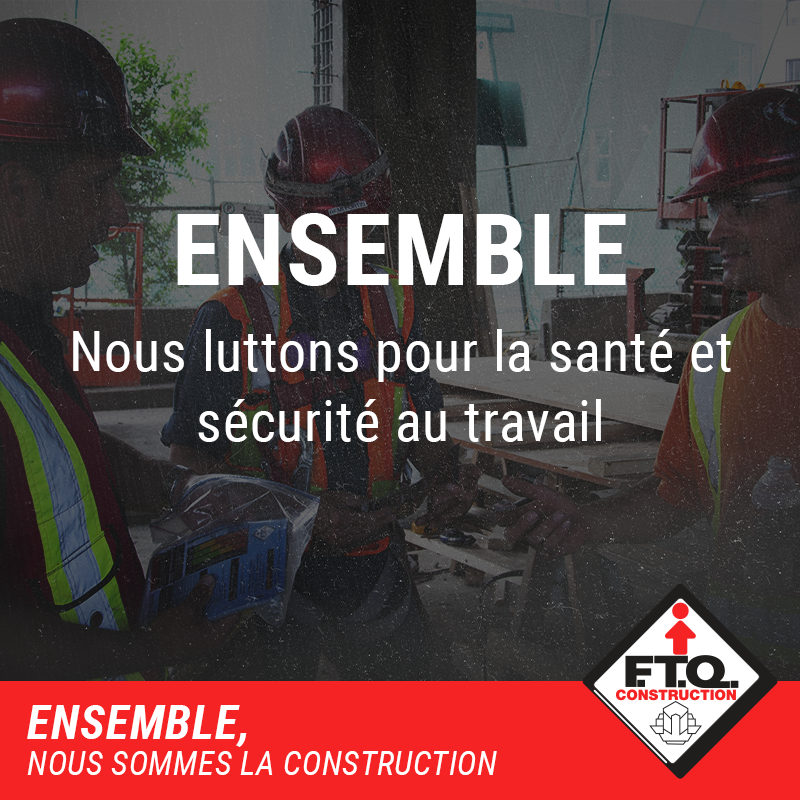 Evans
Dupuis: The problem is that Public
Health, the construction companies and the
CNESST (Labour Standards, Pay Equity and
Workplace Health and Safety Board) do not want
to provide us with the information as to which
worker is affected, whether it is one of our
members, whether they have been tested, whether
they have been declared positive, whether an
investigation has been done, whether everyone
who has been in contact with them has been
investigated, etc. We're not able to get any
information. How can we assess whether the
safety measures in place were adequate? How can
we follow up under these conditions to reassure
workers that everything has been done safely,
that there will be no spread? Evans
Dupuis: The problem is that Public
Health, the construction companies and the
CNESST (Labour Standards, Pay Equity and
Workplace Health and Safety Board) do not want
to provide us with the information as to which
worker is affected, whether it is one of our
members, whether they have been tested, whether
they have been declared positive, whether an
investigation has been done, whether everyone
who has been in contact with them has been
investigated, etc. We're not able to get any
information. How can we assess whether the
safety measures in place were adequate? How can
we follow up under these conditions to reassure
workers that everything has been done safely,
that there will be no spread?
The companies are telling us that this is
personal, confidential information and that we
must go to Public Health in order to get
information. Then Public Health tells us that
this is confidential information. It doesn't
make sense.
For example, we have a crane operator who was
quarantined because he had symptoms. He was
tested. As a rule, if you're going to be tested
because you have symptoms that might be related
to COVID-19, Public Health says you have to
quarantine yourself until you get your results.
We finally found out about the case because the
member called us. He went to Public Health, who
told him that his situation is problematic
because he has been moving around a lot from one
job site to another, that this could be a big
case of COVID. He had just taken a test, which
later proved negative, took a second test, also
negative. His doctor, seeing that the tests were
negative, gave him a note to go back to work,
saying that his symptoms were not symptoms of
COVID-19. This worker will not be paid for his
quarantine period. His tests are negative, so he
will not be covered by the CNESST compensation
system. He will not be eligible for CERB (Canada
Emergency Response Benefit) because he has
earned too much money. He will not be eligible
for EI sickness benefits because his file says
"possible COVID."
In addition, because of the pandemic, joint
health and safety committees are not
functioning. These committees are a place where
one could ask questions, ask what investigation
was done, whether the safety conditions to
prevent COVID-19 were in place, whether the
two-metre distance was respected, whether the
workers were wearing masks, who the worker had
been in contact with.
We are demanding access to information, either
from Public Health or CNESST, so that we can
follow up on different situations. CNESST says
that it is not up to them to inform us, that it
is up to Public Health. Public Health should
work with CNESST to get the information from
CNESST. When there is a workplace accident that
is reported, CNESST gives us the information. If
the accident involves one of my members, I go to
the scene of the accident and argue what the
corrective measures are. With COVID it should be
the same.
WF: How are the safety conditions
on construction sites right now in relation to
COVID-19?
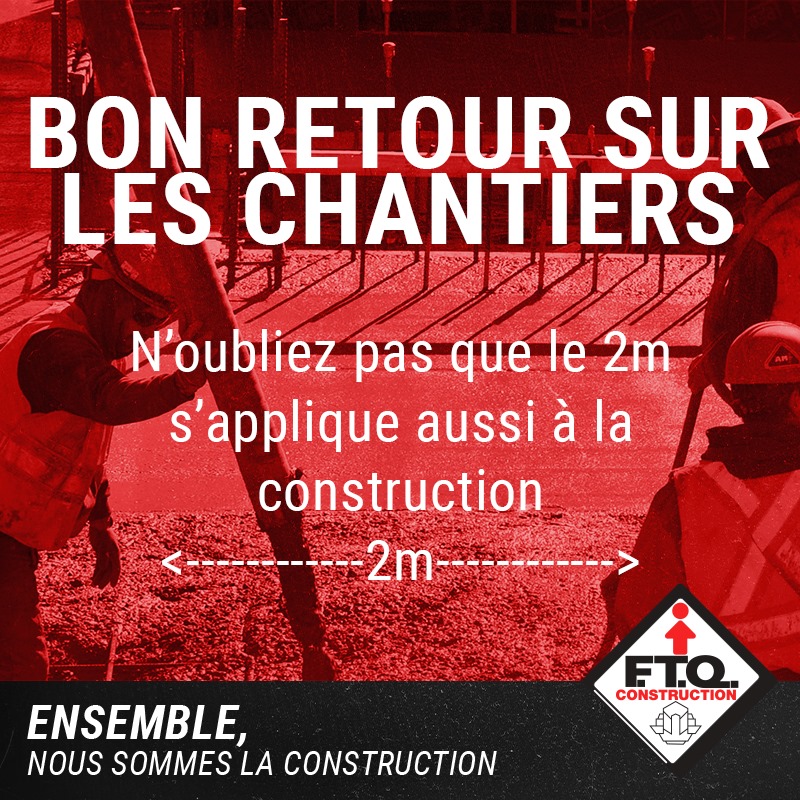 ED:
There are some sites on which there are no
safety measures at all to prevent workers from
contracting COVID. On other sites, companies
tell workers to wear a mask and visor and then
there is no more two metre distancing. In other
places, the two-metre distance is respected. The
situation could degenerate into an epidemic, in
my opinion. ED:
There are some sites on which there are no
safety measures at all to prevent workers from
contracting COVID. On other sites, companies
tell workers to wear a mask and visor and then
there is no more two metre distancing. In other
places, the two-metre distance is respected. The
situation could degenerate into an epidemic, in
my opinion.
When the construction sites reopened, CNESST
pledged to carry out systematic investigations
of the situation with COVID-19 on the sites, but
this is not what is happening. If CNESST is not
there to investigate, and a worker is removed
from the work site, there's a debate as to
whether the worker is going to be compensated by
CNESST, whether they contracted their symptoms
at work, whether it's work-related or not.
CNESST must work with Public Health. It must be
there very actively on the building sites.
What worries me the most is that we might just
think about working and ignore cases of
COVID-19. If there are a lot of cases some sites
are going to close and nobody is going to win.
That's not what we want. It looks like they're
hiding it from us so we don't put pressure on
them. But the health rules are not being
followed. The two-metre rule is not respected.
The working methods are not good. That's what's
hidden with the refusal to provide information.
I hope that both Public Health and CNESST will
be more open and that CNESST will participate in
the investigations so that we can follow up on
COVID cases and take action. It's important.

- Interview, André Racicot,
President, United Steelworkers Local 9291
in Abitibi, Quebec -
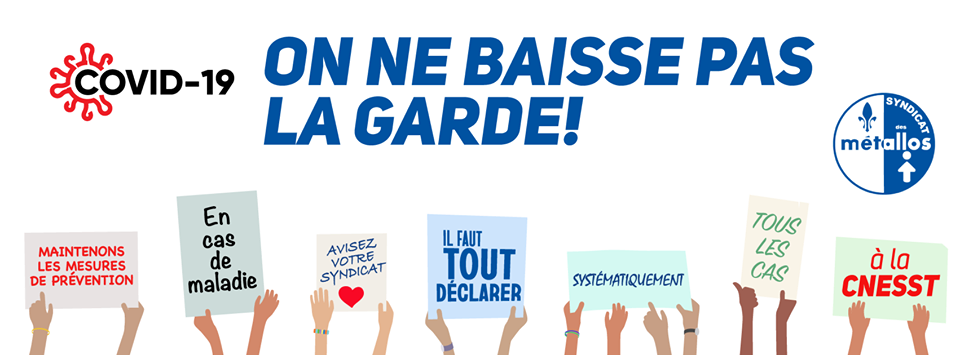
Workers' Forum: What are the most
recent developments in your work in defence of
the health and safety of mine workers within the
context of COVID-19?[1]
André Racicot: Our constant
concern is the application of health standards
in the field to ensure that workers do not
contract and spread COVID-19. In this regard,
the union has asked the employer to release
another full-time prevention representative,
strictly to ensure the application of health
standards, especially those related to the
pandemic.
To give you an example, we have to ensure that
underground equipment is disinfected. I'm
referring here to mobile equipment, haul trucks,
scoop trams, etc. The people who enter each
shift must disinfect the equipment to avoid
possible contamination. A home-made recipe was
used at the beginning, a solution that included
bleach to disinfect the equipment. This was done
because Purell was difficult to find on the
market because of high demand. However as a
disinfectant, a bleach solution is only
effective for a day, as it evaporates very
quickly. For the employer, it was a convenient
solution as it is inexpensive and there's no
need to find a supplier to get the product. We
went into the field to see how it was done, did
research, did our job as prevention
representatives. We then asked the employer to
stop using this type of disinfectant and provide
a real one, and they agreed. Had they refused,
we would have filed a complaint with the CNESST
(Labour Standards, Pay Equity and Workplace
Health and Safety Board).
We must guard against loosening health
standards and regulations, especially if we are
moving towards a second wave. Maintaining the
two-metre distance, washing hands, disinfecting
common tools, disinfecting the separators that
were put in the personnel transport jeeps, etc.
The employer did its job in reopening the mine,
however if no action is taken by the union, if
norms aren't checked, a loosening of standards
sets in. We must ensure that these health
standards become a way of life for workers. We
have to do a lot of work on the ground with
workers to raise their awareness and call them
back to order when needed. We must get the
opinions of the workers at all times. No one
knows the work better than those who do it. We
have a duty as a society, and we also have a
duty as a union to look after the well-being of
our members and to make sure they do not get
sick and spread the disease in their homes or in
the community.
We are going to be stuck with the pandemic for
a long period of time. We are probably going to
have a second wave, so we must be prepared to
deal with it. There have to be high standards in
place, not just in writing, but on the ground.
The employer's priority remains to get as much
ore out as possible, and it's the productivity
side that's paramount for them. This is
especially the case right now with the price of
gold being very high and with the Canadian
dollar at around 70 cents in relation to the
U.S. dollar, as gold trades in U.S. dollars.
With the depreciation of the Canadian dollar,
employers are seeing their profits rise.
In Abitibi, I'm convinced that we're going to
see a series of mines opening, particularly
surface mines that are cheaper to operate than
an underground mine and that can be profitable
with a lower gold grade than for an underground
mine. Right here at Westwood, in addition to the
underground mine, the company has started
operating an open pit not far from here. The
potential for them to make more money out of the
gold is very strong. There are more and more
small mining companies that want to start mining
sites and the big companies are looking at this
and are going to take them over, which is how it
works.
The issue of health and safety then becomes
increasingly important. The pressure is going to
mount to get the ore out quickly to be able to
profit from the situation, and the danger of
accidents at work becomes greater. As extraction
increases, they're going to resort to the use of
contractors to provide them with labour to save
on costs, to not have to rent machinery, etc. We
want them to give the work to our workers, but
if they hire contract workers, we also must
defend them, as they are workers just like us.
Their conditions are part of the working
conditions in the facilities. We don't
differentiate between them and us. Their health
and safety must also be protected.
For us, this means heightened vigilance,
especially in the midst of the pandemic crisis.
We must ensure that all workers go home at night
with all their limbs and not be infected with
COVID-19. To do that, we must educate workers,
train them, be on site, make sure that workers
understand why these health measures are put in
place.
Note
1. See "Quebec
Miners
Demand Public Health Guidelines Are Respected
as Mining Resumes," Interview, André Racicot,
President, USW Local 9291, Abitibi, Workers'
Forum, April 23, 2020

- Toni MacAfee, Atlantic Region
Education and Organization Officer,
Canadian Union of Postal Workers -
Workers' Forum is posting below an
article by Toni MacAfee, dated March 26, about
the fight being waged by postal workers to
affirm their rights and ensure their health and
safety and that of the public as they continue
to provide postal services during the pandemic.
Jeff Callaghan, National Director for the
Atlantic Region of CUPW, who submitted the
article reports that postal workers' fight today
is still very much alive, and has been
throughout the pandemic, on issues such as the
need for adequate protective equipment, the
cleanliness of the workplace, social distancing,
and the right to refuse unsafe work.
***
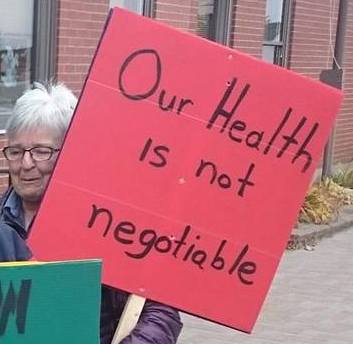 CUPW Atlantic
Region represents members in all four Atlantic
Provinces. This includes all Letter Carriers,
Mail Service Couriers, inside Postal Clerks and
Dispatchers, Retail Clerks, Rural and Suburban
Carriers, Technicians, and Mechanics that work
at Canada Post. CUPW also represent other
workers with other employers; members that
provide delivery services for multiple private
companies that subcontract from Canada Post;
Communication Officers and Transfer
Administrators at the Emergency Medical Care
that do all transfers, call taking and
despatching of ambulances in Nova Scotia; 911
Communications Officers at Medacom in Prince
Edward Island; as well, we represent Cleaners
with Bee Clean in Moncton, Saint John NB and St.
John's Newfoundland postal plants. CUPW Atlantic
Region represents members in all four Atlantic
Provinces. This includes all Letter Carriers,
Mail Service Couriers, inside Postal Clerks and
Dispatchers, Retail Clerks, Rural and Suburban
Carriers, Technicians, and Mechanics that work
at Canada Post. CUPW also represent other
workers with other employers; members that
provide delivery services for multiple private
companies that subcontract from Canada Post;
Communication Officers and Transfer
Administrators at the Emergency Medical Care
that do all transfers, call taking and
despatching of ambulances in Nova Scotia; 911
Communications Officers at Medacom in Prince
Edward Island; as well, we represent Cleaners
with Bee Clean in Moncton, Saint John NB and St.
John's Newfoundland postal plants.
As many workers are now at home, our members
along with healthcare workers, retail workers,
delivery drivers, store clerks, gas attendants
and many other workers providing important
services continue to go to work through this
pandemic.
For workers at Canada Post, the main issues
have been around personal protective equipment,
proper cleaning in our plants, depots and at the
retail offices; and the challenges of social
distancing in plants and depots, as well it has
been a concern while our folks are out
delivering and serving customers at our retail
counters.
Our members have fought extremely hard to
ensure that we have strong language in our
collective agreements to protect our rights and
to enforce that our health and safety is
protected. Now, more than ever, our members and
Locals are making sure those rights are
enforced. Since the beginning of this crisis,
CUPW members have invoked their right to refuse
over the issues mentioned above, as well as
other health and safety issues that were not
being dealt with in their workplaces in a timely
and appropriate manner.
Being a health and safety representative in
CUPW right now is a very challenging position
but our members and our Locals have been very
vocal in demanding that our members' rights and
health and safety be protected. Local executive
members are working day in and day out making
demands to the boss to have the proper tools
needed for members to do their jobs safely.
We have seen a real disconnect between what
management is saying at the top level and what
is actually being implemented on the work floor.
It would seem not all management are taking this
pandemic as seriously as our membership, which
often leaves our members with no choice but to
refuse to work in unsafe working conditions.
There have been many occasions that individual
managers and supervisors have made the wrong
call, and our Locals have challenged those
issues on the work floors and, when appropriate,
have escalated that information to the Region
for discussion at the next level.
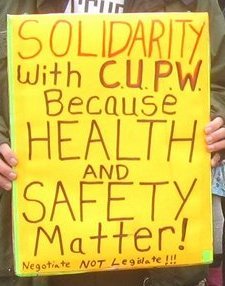 As postal workers
continue to provide services at retail counters,
sorting your mail and parcels, delivering your
products to you, we would ask that you respect
the social distancing protocols while we work.
Often times, people will gather as workers are
sorting into apartment mail panels and community
mailboxes. We would ask that you please wait
until we are done our work and respect our space
to ensure everyone's safety. At retail counters,
we would ask that you follow the guidelines that
have been set up in those offices that call for
limited customers and social distancing. As postal workers
continue to provide services at retail counters,
sorting your mail and parcels, delivering your
products to you, we would ask that you respect
the social distancing protocols while we work.
Often times, people will gather as workers are
sorting into apartment mail panels and community
mailboxes. We would ask that you please wait
until we are done our work and respect our space
to ensure everyone's safety. At retail counters,
we would ask that you follow the guidelines that
have been set up in those offices that call for
limited customers and social distancing.
As details change every day in every province,
our members continue to fight back against the
employer to ensure health and safety is
respected. We need Canada Post and the
government to ensure that workers have the
proper tools to do their jobs safely. We cannot
have workers already in a high stress situation,
worried about if when they arrive at work they
will have gloves, hand sanitizers and
disinfectant wipes that are highly needed.
Canada Post and the Government cannot use costs
as an excuse not to protect our members. We need
guarantees that our work places and equipment
will be properly cleaned, that protections such
as plexi-glass dividers are installed and
gloves, hand sanitizer, disinfectant wipes are
readily available every day. Otherwise, our
members will have no choice but to refuse unsafe
working conditions.
When you see your postal worker, or any worker
for that matter, working in and for the public
during this crisis, remember to be kind,
respectful and do all you can to ensure that
their safety is protected. While we fight to
ensure our safety, we are also fighting to
protect yours.
When all this chaos is over and the dust
settles, every single one of us needs to
remember which workers were there providing
services to meet our needs during this time. We
will also need to ensure that governments and
employers show these workers the respect they
deserve by demanding that they get better
rights, wages, benefits and protections.

(To access articles
individually click on the black headline.)
PDF
PREVIOUS ISSUES
| HOME
Website: www.cpcml.ca
Email: office@cpcml.ca
|

